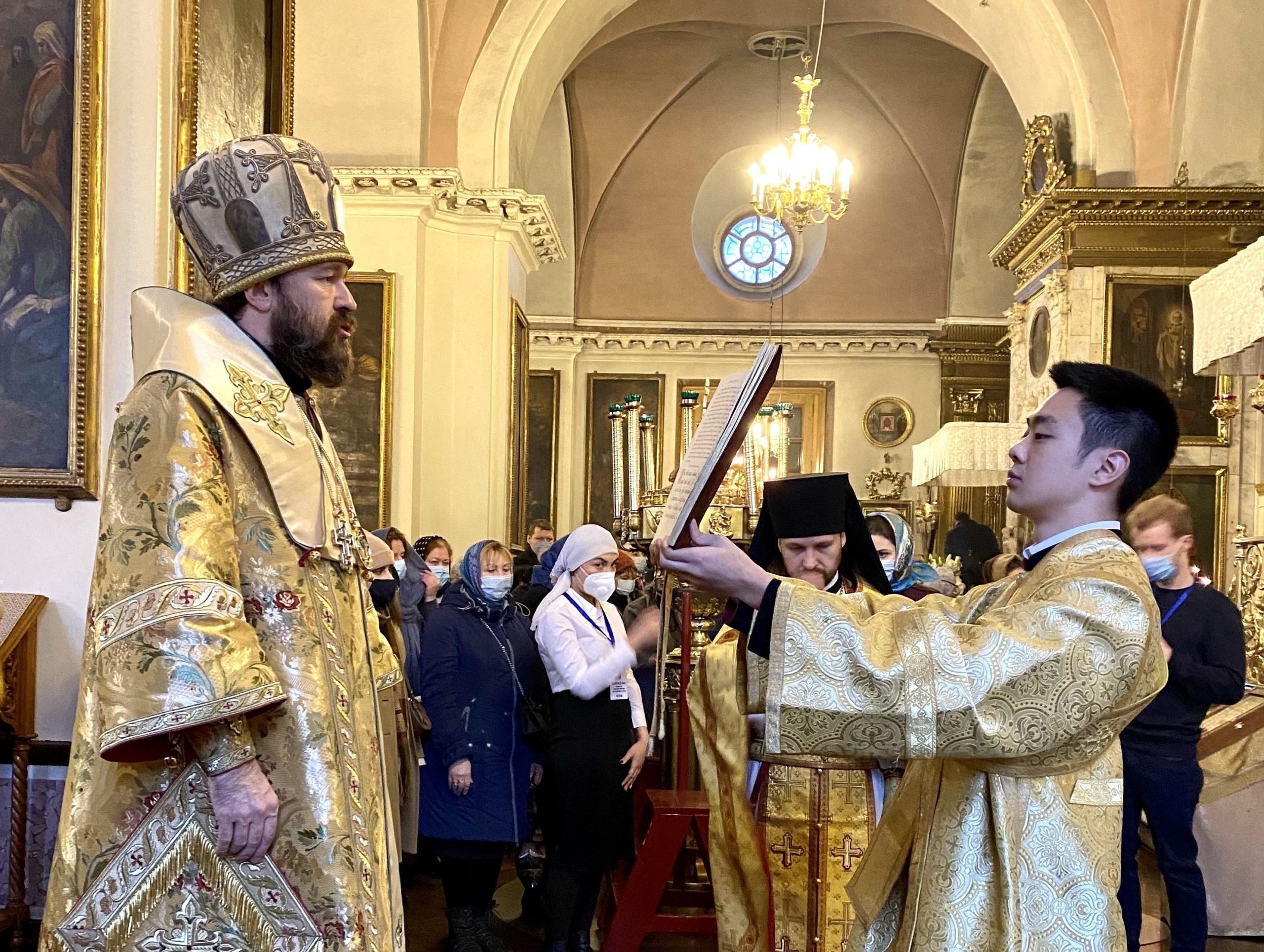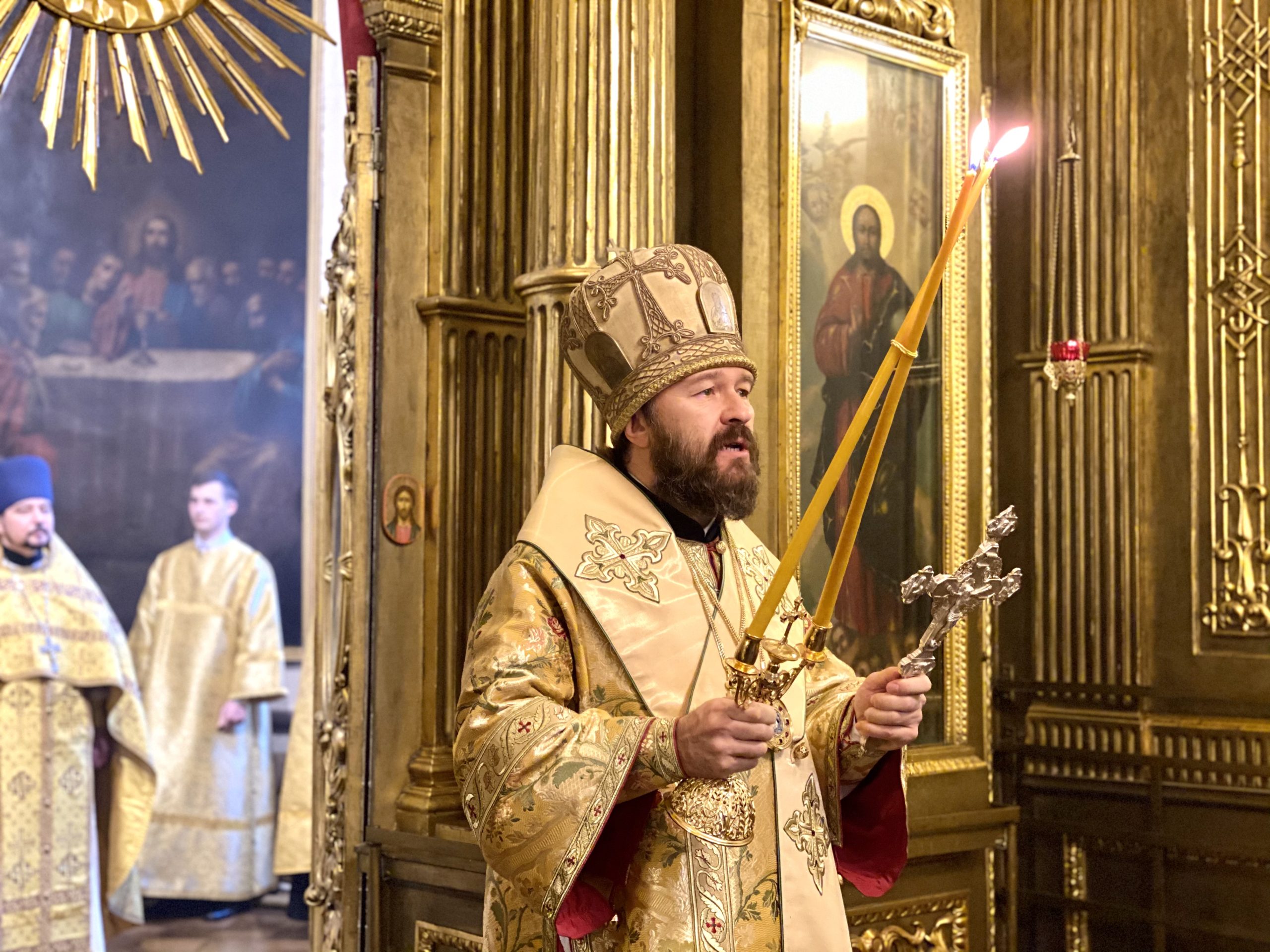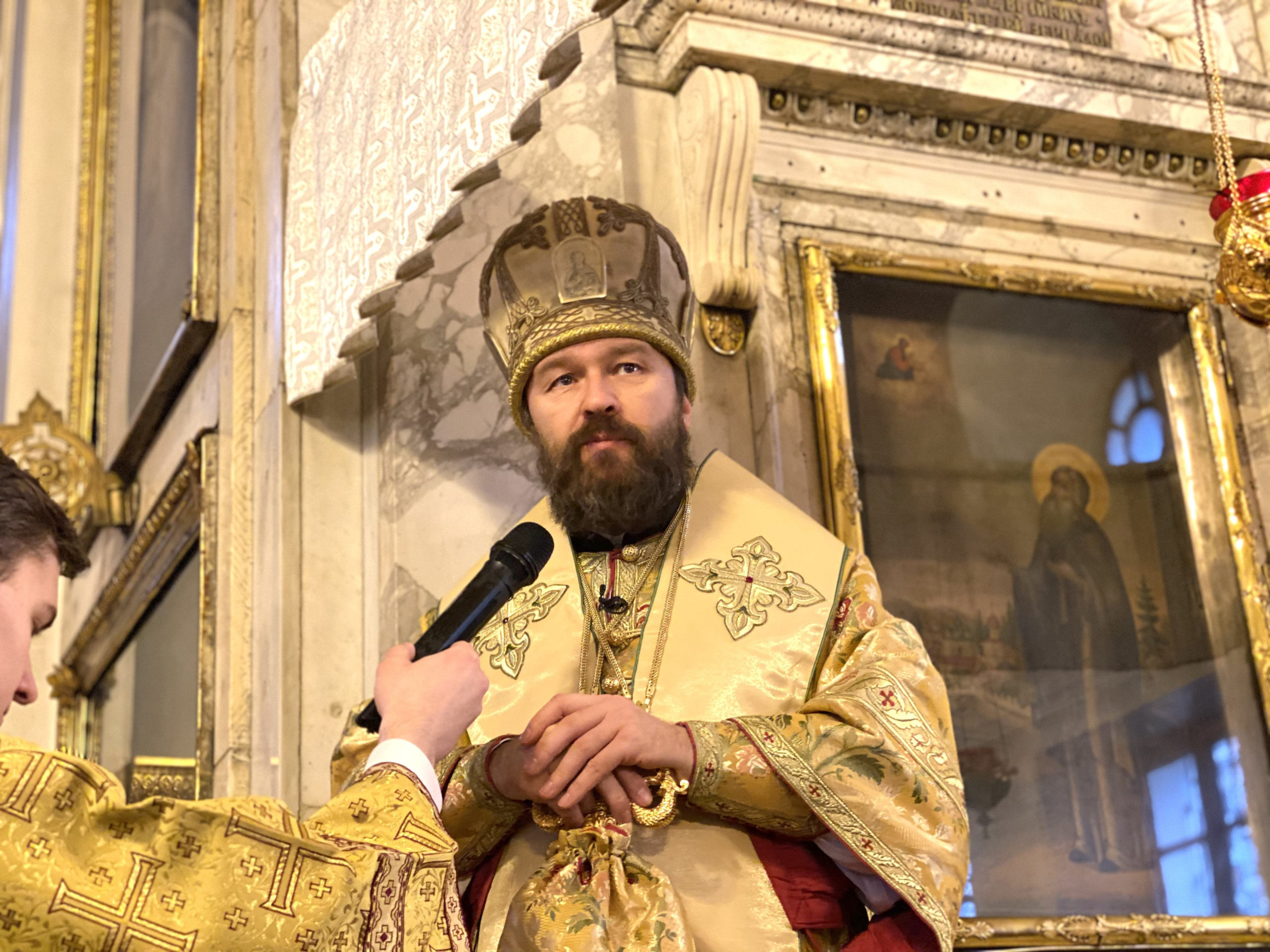Metropolitan Hilarion: We can always show compassion for people








On 29th November 2020, the 25th Sunday after Pentecost and the commemoration day of St.Matthew, Metropolitan Hilarion of Volokolamsk, chairman of the Moscow Patriarchate Department for External Church Relations, celebrated the Divine Liturgy at the Moscow church ‘Joy to All the Afflicted’ icon of the Mother of God on Bolshaya Ordynka. Clergymen of the church assisted the archpastor.
During the Prayer of Fervent Supplication, petitions were offered up over the threat of the spreading coronavirus infection.
Metropolitan Hilarion lifted up the prayer recited at a time of the spread of a pernicious epidemic.
After the Liturgy, His Eminence Hilarion delivered a sermon:
“In the Name of the Father, and the Son, and the Holy Spirit!
Dear reverend fathers, brothers and sisters, I congratulate you on the feast day and Sunday.
The Nativity Fast has begun yesterday, and we continue our spiritual journey to the Bethlehem Сave where our Lord and Saviour Jesus Christ has been born for us.
The Church is preparing for the Nativity of Christ for forty days during which we are called to ponder on the meaning of the Incarnation for the whole humanity and for each of us.
There is no more helpful book for the preparation for this event than the Gospel according to Matthew. It is not fortuitous that we commemorate St. Matthew on the second day of the Nativity Fast. We recall the evangelist who has told us about the birth of our Lord Jesus Christ from the Holy Spirit and the Virgin Mary, narrated precious details of the beginning of Jesus Christ’s earthly life and the Sermon on the Mount, as well as many parables taught and miracles performed by the Son of God, and – along with the other three evangelists – he told us about the Passion, Death on the Cross and Resurrection of the Saviour.
If you find some spare time today, read the Gospel according to Matthew from beginning to end. If one day is not enough, take a few days. May St. Matthew remind us of the events to which the Nativity of Christ is dedicated.
Today we have heard the parable of the Good Samaritan. Our Saviour said it when talking with a lawyer who asked him a question: ‘Which commandment in the law is the greatest?’But Jesus Christ made him answer this question himself.
It often happens that we put a question to the Lord, and He as though asks us ‘What do you think yourself? Don’t you know it yourself?’ Sometimes we ask God very naïve questions, but the Lord does not answer them because He wants us to find the answer by ourselves.
Where should we look for the answer? First, in the Holy Scriptures, which gives us answers to many questions. Second, in the Tradition of the Church and in the writings of the Holy Fathers. Third, in our life and in the events through which the Lord talks with us, revealing His will. Most important for us is to be open for hearing the will of God.
The lawyer answered Jesus’ question about the greatest commandment and asked the Lord: ‘And who is my neighbor?’ (Lk 10:29). The Lord could have asked him: ‘Who do your think is your neighbor?’ Most probably, the lawyer would have answered that his neighbor was the one belonging to his nation and religion. What else could it be? That was the Old Testament perception of the neighbor. The lawyers had excluded from neighbors all those who belonged to other nations or other religious traditions. Moreover, the lawyers had contempt for such people, treated them as enemies and despised them, even those who were keeping the faith, for instance, the Samaritans, who believed in One God, but did not go to the Temple of Jerusalem to worship, and in lawyers’ view their faith was not pure. To call a man ‘a Samaritan’ was the greatest offence. When the Jews wanted to offend Jesus Christ they said: ‘You are a Samaritan and have a demon’ (Jn 8:48). They could not find more insulting words.
Answering the lawyer’s question about the neighbor, the Saviour told the parable of a man who was going down from Jerusalem to Jericho, and fell into the hands of robbers who beat him and went away leaving him half dead. A priest and a Levite, full of their own affairs, were going down that road and saw the stripped and injured man. The Old Testament teaches not to touch corpses not to be defiled, and they thought: What if this man is dead and I will be defiled touching him. It is better to pass by on the other side, and let someone else help him.
And seeing this unfortunate man was a Samaritan, a man who according to the strict Judaic law was not a true believer. The Jews thought that the Samaritans had distorted the Scriptures, and their faith was not what it should be and their blood was not what it should be because they have mixed the clean Judaic blood with the unclean Pagan blood. But it was the Samaritan who has shown compassion for his neighbor, mercy which anyone passing by should have shown in accordance to the law of God.
The Samaritan bandaged his wounds, put him on his own animal, brought him to an inn, told the innkeeper to take care of him and gave him money to do it. It was the Samaritan who had been merciful to this suffering unfortunate man.
By the parable of the Good Samaritan the Lord tells us that religiosity is expressed not only in the compliance with certain rules, but first and foremost in our attitude to our neighbours. If we adhere to all rules, keep the fasts, pray in the morning and in the evening and do anything prescribed and necessary, but have no love of our neighbor in our heart, then how can we say that we love God? ‘Those who say “I love God, “and hate their brothers or sisters, are liars; for those who do not love a brother or sister whom they have seen, cannot love God whom they have not seen ‘(1 Jn 4:20).
Our religiosity and our faith should find expression in our deeds. Every man who needs our help no matter whether he asks for it or not is our neighbour. A man who fell among thieves did not ask for help. He was lying half-dead, and the Samaritan who was passing by heard the voice of his conscience and came to this unfortunate man’s rescue. The Lord praised him for that and told us about him thus giving us an example to follow.
The neighbor is the one who needs our help and compassion now, the Lord says. We may have no opportunity to render him material aid, but we always can help him spiritually, to comfort him with kind words, show compassion on him, and say something that would make his spirits rise.
Let us listen to Gospel lessons which the Holy Church is offering us every day and stay in tune with Gospel. Let us ask the Lord to help us show our love of God and our neighbors and to go along the way to the Nativity Fast with dignity.
Take care of yourselves, your near and dear, and may the Lord keep all of you.
